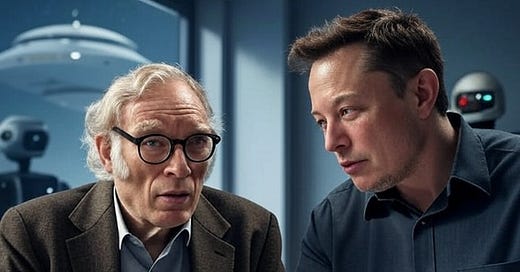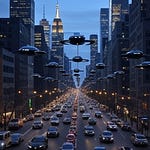In an era defined by unprecedented technological advancement, we live in what can arguably be called the greatest period in human history. The exponential growth of technology since the Industrial Revolution in the 19th century has transformed the quality of life for the average person in developed nations, surpassing even the opulence of historical figures like Julius Caesar, Louis XIV, or Charles I. This remarkable progress owes much to visionary entrepreneurs—Thomas Edison, Henry Ford, Bill Gates, and, in our time, Elon Musk—who have turned the dreams of science fiction into reality.
Yet, a provocative question arises: Who is more important—Elon Musk, the quintessential executor, or Isaac Asimov, the visionary whose ideas inspired generations? The answer lies in understanding the symbiotic relationship between imagination and execution, between the visionaries who dream and the builders who act.
The Power of Ideas: Science Fiction as a Catalyst
Many of today’s most influential entrepreneurs—Elon Musk, Jeff Bezos, Mark Zuckerberg—share a common trait: a childhood steeped in science fiction and fantasy. These stories, crafted by authors like Asimov or Jules Verne, ignited their imaginations, planting the seeds for ambitious projects that now shape our world. Asimov’s tales of robotics inspired Musk’s development of Optimus, Tesla’s humanoid robot. Similarly, Gerard K. O’Neill’s concepts of space colonies fueled Bezos’s vision for Blue Origin and his pursuit of O’Neill Rings—massive orbital habitats.
Science fiction is more than entertainment; it’s a wellspring of ideas that challenge the boundaries of possibility. These stories provide the “why” behind innovation, giving entrepreneurs a north star to guide their efforts. Without the imaginative frameworks of authors like Asimov, the drive to create transformative technologies might lack direction or purpose. Ideas, in this sense, are not mere commodities but rare sparks that ignite progress.
The Art of Execution: Turning Dreams into Reality
However, ideas alone remain intangible without execution. As Jack Dorsey, co-founder of Twitter, famously said, “Ideas are a commodity; execution is an art.” Entrepreneurs like Musk excel at this art, transforming abstract concepts into tangible innovations. Musk’s ventures—SpaceX, Tesla, Neuralink, The Boring Company—demonstrate an unparalleled ability to navigate complex challenges, secure resources, and deliver results. Without such execution, the most brilliant ideas would remain confined to the pages of novels.
Dorsey’s statement, while insightful, oversimplifies the dynamic. Not all ideas are equal. The profound, paradigm-shifting visions of science fiction are far from commonplace—they are rare gems that inspire action. Yet, execution is what breathes life into these visions. Musk’s ability to land rockets, produce electric vehicles at scale, or develop AI-driven robots is the bridge between imagination and reality.
Vision vs. Action: A False Dichotomy
The debate over whether vision or action takes precedence is a false dichotomy. Both are indispensable, each feeding the other in a virtuous cycle. Vision provides the inspiration, the “what” and “why” that motivate action. Execution, in turn, uncovers new possibilities, refining and expanding the original vision. For instance, Musk’s work on SpaceX began with the dream of colonizing Mars, inspired by science fiction. But through the process of building reusable rockets, new insights emerged, shaping his vision further.
This interplay is evident across history. Edison’s light bulb was inspired by the desire to improve human life, but his relentless experimentation turned that vision into reality. Similarly, Ford’s assembly line was a practical solution to a grand idea: making cars accessible to the masses. Vision and action are two sides of the same coin, each incomplete without the other.
The Equal Importance of Musk and Asimov
Elon Musk is a master executor, but without the ideas that inspired him, he would have nothing to execute. Isaac Asimov, with his boundless imagination, provided the intellectual fuel for generations of innovators, yet his stories would remain fiction without entrepreneurs to actualize them. The brilliance of science fiction lies in its ability to inspire, while the genius of entrepreneurship lies in its capacity to deliver.
In the end, asking whether Musk or Asimov is more important is like asking whether the heart or the brain is more vital to life. Both are essential. The visionaries who dream of better futures and the executors who build them are equally critical to humanity’s progress. As we continue to live in a world that feels increasingly like science fiction, let us celebrate both the storytellers and the builders, for together they shape the greatest era humanity has ever known.











Share this post